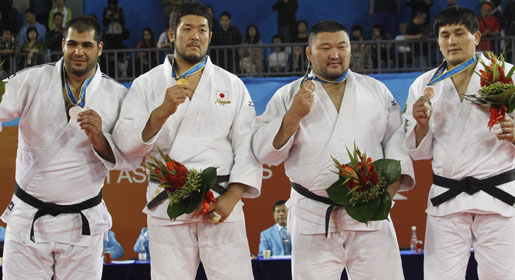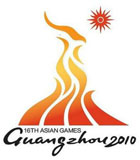
Gold medalist Takahashi Kazuhiko of Japan, second left, silver medalist Mohammad Reza Modaki of Iran, left, and bronze medalists Munkhbataar Khadbataar of Mongolia, second right, and Utkir Kurbanov of Uzbekistan pose for photographers during the medal ceremony of the men's open category judo at the 16th Asian Games in Guangzhou, China. -Photo by AP
GUANGZHOU: For most countries, winning almost half of the gold medals on offer in any given sport at an international meet would considered a decent result.
When it comes to judo and Japan, where the sport was born and bred, that’s not good enough.
Japan’s judo team narrowly squeezed past South Korea to top the gold medal tally as the Asia Games judo competition closed Tuesday, claiming seven golds to six for the South Korean squad.
Chinese athletes broke the duopoly, taking two victories on the final day, and an Uzbek claimed another.
Japan went into the closing day of the competition evenly matched with South Korea with six gold, two silver and three bronze medals. The final day was a let down for both Japan and South Korea.
“We are going to have to learn from our mistakes here or we will have problems in London,” team official Kazuo Yoshimura said of Japan’s Olympic aspirations in 2012.
Kazuhiko Takahashi brought Japan its seventh judo gold by upending the much larger Mohammad Reza Rodaki of Iran with 54 seconds left in their open class final.
But China’s Liu Huanyuan answered the home crowd’s cheers by scoring a “yuko” point and then holding on until the bell against South Korea’s Kim Na-young in the women’s open class.
Japan’s next chance at a gold was burst by world champion Rishod Sobirov, who manhandled an injured Hiroaki Hiraoka to claim the gold by scoring two points that added up to ippon in the men’s 60 kilograms.
In the women’s under-48-kilogram class, Japan’s Tomoko Fukumi and China’s Wu Shugen fought through regular time without scoring. The two appeared evenly aggressive in overtime, but the judges ruled in Wu’s favor and gave her the gold.
Japan officials said it was a bad call, and said the team was out of focus after competing in the World Championships in Tokyo two months ago.
But gold medalist Takahashi said Japan has a lot of work to do ahead.
“The best thing about Japan’s style of judo is going for the ippon, and the beauty of that,” he said. “But we are seeing many foreign athletes competing well today.”
Japan’s showing this time was far better than its disastrous run in the previous Asia Games, in Doha four years ago, when their team managed only an embarrassing four golds.
At the Beijing Games, judo was all over the map.
Medalists included Mongolia, which won its first ever Olympic gold, an accomplishment that sent cheering crowds to the streets of Ulan Bator. Tajikistan got its first Olympic medal, too. Georgia _ getting a respite from hostilities that were then shaking their nation _ claimed a gold, and so did Italy, Romania, Germany and Azerbaijan.
Leaving the door open for the world to rush in was the decline of Japan, which got a record eight of the 14 golds in Athens. But it claimed just four _ two apiece from the men and women _ in Beijing.
Still, despite its sometimes inconsistent showings abroad _ and South Korea’s strong challenge _ Japan is generally considered the team to beat.
Japanese athletes have won more judo golds in the Asian Games and Olympics than any other nation and maintain a strong presence at the top of the world rankings list.
Japan sent six athletes who are currently ranked No. 1 in the world to Guangzhou, including Takashi Ono, who won gold in the men’s under-90 kilogram class; Kaori Matsumoto, winner in the women’s under-57 kilograms; and Misato Nakamura, a flop at the Beijing Olympics but a gold-winner here in the under-52 class.
The other victors were Hiroyuki Akimoto in the men’s under-73 kilograms and Yoshie Ueno, another reigning world champion who’s sister, Masae, was a double-gold Olympian. Ueno, competing with a black eye after being apparently struck several times by a North Korean opponent, won by ippon in the under-63 kilogram class.
Mika Sugimoto won the women’s 78-kilogram class on Saturday.
Japan’s world No. 1 and reigning world champion Takamasa Anai could only manage a silver in the under-100 kilogram class, however, losing to Hwang Hee-tae of South Korea.
Japan’s Mina Watanabe, who had been a favorite in under-70 kilogram class, had a disappointing showing, losing to China’s Chen Fei in a bronze-medal matchup _ a loss she said could bode ill for London.
“I didn’t find my own competition style in the contest,” she said. “Losing at the Asian Games will make it hard for me to win at the London 2010 Olympics.” -AP





